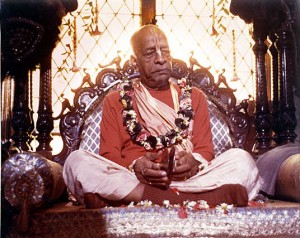
Srila Prabhupada at the Bahulaban Temple.
Srila Prabhupada Visits New Vrindaban – June 23rd, 1976.
Excerpt from Hari Sauri’s Trancendental Diary.
Ekadasi. Prabhupada said very little on his walk and the class was short. He is experiencing disturbing heart palpitations and his uremia has caused his legs and feet to swell again. It was a strain for him to even be out. Thankfully, his toothache seems to have disappeared and his face is no longer swollen. During the day he rested a lot and did not see anyone.
However, by evening he seemed stronger and so went out into the garden to grace the eager devotees with another darsana. Sitting in the shade of the trees, he chanted on his large tulasi-mala. He had Pradyumna prabhu read from the Bhagavad-gita Chapter Six, stopping occasionally to ask if there were any questions, and then supplying his transcendental insights, both practical and philosophical.
Kuladri prabhu wanted to solve a quandary that comes up occasionally in the course of preaching. “Srila Prabhupada, when we explain that our activities are spiritual, what we are doing is spiritual … Just like we say the quality of the tape recorder becomes spiritualized when it’s used in Krsna’s service. So the materialists, they don’t understand. They say, ‘Well, the tape recorder will also break, the tapes will also be burned up.’”
Prabhupada saw nothing contradictory in that. “That’s all right. It will go to Krsna. Breaking, where it will go? Hmm?”
Kuladri replied, “They say the chemicals again become …”
“That chemical, where it will go?” Prabhupada asked, immediately giving the answer. “Yato va imani bhutani jayante … abhisamvisanti. Everything is created from Krsna, again it returns to Krsna.”
“Then they say then we needn’t play Krsna conscious music. We might as well play rock and roll if it is going back to Krsna.”
Prabhupada shook his head. “That is maya. This is meant for Krsna’s service. As soon as you do anything else, then it is maya. Maya is also Krsna’s maya, but under maya we suffer; under Krsna we enjoy.”
Kuladri understood, realizing the implications of their daily labors in devotional service. “So if we engage everything here in Krsna’s service, then the atmosphere will change. They can notice the change in the atmosphere.”
“Yes,” Prabhupada said. “That is real atmosphere. Sva-rupena vyavasthitih. Mukti means to stay in the original form.”
The mention of “original form” prompted one devotee to ask just what the spiritual form of the soul might be. He had heard Srila Prabhupada’s example that a glove has its form because of the shape of the hand, but he wasn’t sure exactly what this meant. He wanted to know if it meant the soul within the tree’s body is shaped like a tree.
Prabhupada explained that in the material world form is fixed, but in the spiritual world it is not. Krsna has many forms because everything is spiritual in that world.
Another devotee asked, “So the form in the spiritual sky is not absolute either? We can take different forms in the spiritual sky?”
“Yes,” Srila Prabhupada assured him. “There are also many forms, but all of them are spiritual. The Vrndavana, there is tree, there is Yamuna water, there is land, there is cow, there is calf, there is gopas, gopis — they are all spiritual. Just like from earth you make many forms. You make pots, you make dolls, but they are all earth. Similarly, spiritual world, there are many forms, they are all spiritual. What is the difficulty?”
Pradyumna asked whether that form ever changed.
Prabhupada said yes, but added, “Generally, it does not change, if one likes this type of form — santa, dasya, sakhya, vatsalya, madhurya.” He also added that such a change is not material. “The spiritual bliss is there, either in this form or that form.”
Pradyumna prabhu continued with his recitation of Bhagavad-gita, and everybody listened attentively as he read out verse 6.24. “One should engage oneself in the practice of yoga with undeviating determination and faith. One should abandon, without exception, all material desires born of false ego and thus control all the senses on all sides by the mind.”
After the purport Prabhupada called for questions. A devotee asked, “For someone whose determination wavers and slackens here and there, is there ever a point where the neophyte devotee is in danger of just forgetting everything and falling, tumbling completely back?”
Prabhupada wasn’t strident in his reply but he made it clear that he did not expect such weakness in his disciples. He repeated more or less what he had told us in Hawaii. “Everyone is neophyte. He should practice with determination, that’s all. If he cannot practice, then why should he enter into this association? Let him remain aloof. One who has entered with the determination that ‘I must practice,’ so if he cannot practice, then why this make-show that ‘I belong to Krsna consciousness movement. I am initiated.’ Why this farce? He must practice with determination that ‘By practicing I’ll be success.’ That is wanted. He has no determination, why should he make a show? Drdha-vrata, that is wanted, determination. Hmm? Go on. When one is determined, his success is assured. If he’s not determined, then success or failure.”
“Can one develop determination gradually?” someone asked.
“Why gradually?” Prabhupada replied. “When you promise before your spiritual master that no illicit sex, no gambling, no meat-eating, why should you fall down? If you have no determination, why should you promise in presence of the Deity, fire, spiritual master, Vaisnava? Why do you make this farce, if you have no determination? If you want to make it a farce, that depends on you. But you should not fall down, that is determination. That is gentleman’s determination, that ‘I have given my promise. Why shall I fall down?’ That is determination. ‘I must respect promise.’ That is called drdha-vrata.
“So he’ll success. Where is the difficulty? There is no difficulty. But if we want to cheat, that is another thing. If we have no determination, we should not take up this life. Therefore, chance is given that ‘Stay with us for six months or one year; be determined, then be initiated.’ If you are not determined, what is the use of false initiation?”
By his response, the devotee seemed to imply that one does not always have control. “Sometimes this weakness seems to be …”
Prabhupada cut him off. He was unsympathetic to excuses. “Weakness there, you should rectify weakness. Why you should give any importance to weakness? Weakness is weakness. Rectify it.”
Kuladri observed that our promise to follow four regulative principles and chant sixteen rounds daily is the minimum level of determination. We must increase from there.
Prabhupada agreed. “Initiation means ‘minimum, just beginning.’ That is the dictionary meaning, initiation.” He elaborated on the progressive stages of devotional service as enunciated by Srila Rupa Gosvami, emphasizing the stage of anartha-nivrtti, the giving up of unwanted activities. He especially focused on the need to avoid meat-eating and illicit sex. In Vaikunthaloka he said, there is so much transcendental pleasure that the inhabitants are astonished that one might find pleasure in sex. “That stage is possible,” he assured us. “Everything depends on practice. That requires determination.”
After all the talk of the potential difficulty in just following the basic practices, it probably wasn’t so wise for one of the devotees to then ask what happens when one returns to his svarupa, his natural form. After the recent episode in Los Angeles he was clearly alert to the dangers of devotees leaping ahead of themselves. He didn’t even let the boy finish. “First of all, anartha-nivrtti. You are accustomed to so many bad habits. First of all try to rectify it, then talk of svarupa. Where is your svarupa? Simply wasting time. A man is diseased, he’s thinking, ‘When I shall be cured I shall go to this hotel, I shall eat like this.’ First of all cure, then talk of eating this and that. Svarupa, when you are cured, that is svarupa. So long you are not cured, what is the use of talking svarupa? First business is cure yourself. Anartha-nivrtti, then svarupa will come.”
Prabhupada spoke firmly. “That is the babajis. In Vrndavana, you have seen? Siddha-pranali. They are smoking and having illicit sex with one dozen women — svarupa. Rascal! This is called sahajiya, a rascal. Condemned. Where is your svarupa? Don’t talk unnecessarily. First of all come to svarupa, then talk of svarupa.”
“So our motivation should be to get free from birth, disease, old age and death,” the devotee said.
“That is already explained.” Prabhupada repeated the stages of advancement he outlined previously and told him, “But you must be determined how to execute devotional service. Without determined devotional service, how we can attain that position? So what is the use of talking utopian? First business is you adopt this means that you have got full faith that ‘Krsna consciousness will save me.’ Then you live with devotees who are similarly determined. Then you execute devotional service. Then anartha-nivrttih syat, you’ll be free from all these. These are the stages. Up to anartha-nivrtti, you have to struggle very hard with determination, and then automatically everything will come — tato nistha tato rucis tatah saktis tato bhavah. So before svarupa, anartha-nivrtti, don’t expect all these.”
During the whole period of the darsana some local youths, who live just down the road, roared back and forth on motorcycles, even stopping on occasion at our driveway entrance to turn and go back. The howl and whine of their engines, though an intrusion on our peaceful gathering, was nothing more than a mild annoyance and Prabhupada didn’t allow it to disturb his preaching. He wondered with a chuckle whether they were doing it on purpose. Kuladri said they were, although he said they are better behaved now than before.
“Demons,” Prabhupada declared. “Everywhere in this world is like that. Even the father will give trouble-Prahlada Maharaja-what to speak of others. Demon father is giving trouble to a Vaisnava son. And not grown-up son, five years old, innocent, but he’s giving trouble.”
Still, the concensus is that local relationships are definitely improving. One devotee said that today a state policeman stopped him to inquire whether Srila Prabhupada was here yet.
Prabhupada smiled. “However demon he may be, they can appreciate that these are ideal characters.”
 Krsna consciousness has spread successfully in the country through the years and like everywhere Bulgarian devotees are very sweet and eager for Krsna-katha, kirtan and prasadam Read more ›
Krsna consciousness has spread successfully in the country through the years and like everywhere Bulgarian devotees are very sweet and eager for Krsna-katha, kirtan and prasadam Read more ›  Krsna consciousness has spread successfully in the country through the years and like everywhere Bulgarian devotees are very sweet and eager for Krsna-katha, kirtan and prasadam Read more ›
Krsna consciousness has spread successfully in the country through the years and like everywhere Bulgarian devotees are very sweet and eager for Krsna-katha, kirtan and prasadam Read more ›  Have you ever wanted to bring Family or Friends to visit Sree Dham Mayapur and felt you needed a bit of inside help? The "Friends and Family" service is inspired by the experiences of devotees' relatives visiting the holy dham, and possibly India, for the first time
Have you ever wanted to bring Family or Friends to visit Sree Dham Mayapur and felt you needed a bit of inside help? The "Friends and Family" service is inspired by the experiences of devotees' relatives visiting the holy dham, and possibly India, for the first time 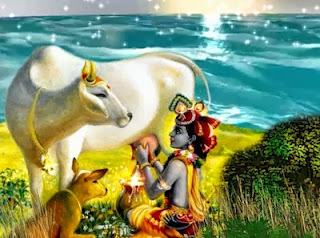



 On Saturday, 31st August 2013, the Friends of Animals Society, with the technical help of the Vegehop restaurant, organized a vegan feast for the President of The Republic of Croatia, Ivo Josipovic, in his residence on Pantovcak, Zagreb. Devarsi Narada das presented him with the First Canto of Srimad Bhagavatam, Isopanisad and Perfect Questions, Perfect Answers, all with an inscription: "To our dear President, I. Josipovic, from the Hare Krishna Community in The Republic of Croatia."
On Saturday, 31st August 2013, the Friends of Animals Society, with the technical help of the Vegehop restaurant, organized a vegan feast for the President of The Republic of Croatia, Ivo Josipovic, in his residence on Pantovcak, Zagreb. Devarsi Narada das presented him with the First Canto of Srimad Bhagavatam, Isopanisad and Perfect Questions, Perfect Answers, all with an inscription: "To our dear President, I. Josipovic, from the Hare Krishna Community in The Republic of Croatia." 
 Srila Sanatana Goswami's shortest and simplest work - an offering of praise in 432 verses, punctuated by 108 acts of respectfully bowing down. Spend Kartika with Srila Sanatana Goswami's personal meditation on Lord Krishna's Vrndavana pastimes as he summarized them from Srimad-Bhagavatam
Srila Sanatana Goswami's shortest and simplest work - an offering of praise in 432 verses, punctuated by 108 acts of respectfully bowing down. Spend Kartika with Srila Sanatana Goswami's personal meditation on Lord Krishna's Vrndavana pastimes as he summarized them from Srimad-Bhagavatam  How many devotees will answer the question of how Mother Sita was banished by Sri Rama to Valmiki’s hermitage? “Rama was righteous… He set an example for all…?” Or is there a deeper reason? Such an answer can take the ‘controversy’ out of it
How many devotees will answer the question of how Mother Sita was banished by Sri Rama to Valmiki’s hermitage? “Rama was righteous… He set an example for all…?” Or is there a deeper reason? Such an answer can take the ‘controversy’ out of it  Goloka Chart- a depiction of the spiritual world, based on Brahma samhita, Laghu Bhagavatamrta, Brhad Bhagavatamrta, Srimad Bhagavatam and Caitanya Caritamrta has been printed
Goloka Chart- a depiction of the spiritual world, based on Brahma samhita, Laghu Bhagavatamrta, Brhad Bhagavatamrta, Srimad Bhagavatam and Caitanya Caritamrta has been printed  The place where the station is situated was formerly a large goods yard. The present car and bus parking areas, as well as the path to the station, formed part of a coal loading yard. The present-day platforms were once used as goods lines and formed part of the large Chitpur Rail Yard.
The place where the station is situated was formerly a large goods yard. The present car and bus parking areas, as well as the path to the station, formed part of a coal loading yard. The present-day platforms were once used as goods lines and formed part of the large Chitpur Rail Yard. 
 The Bhaktivedanta Cultural Center features an extraordinary exhibit of India's timeless heritage with a magnificient traditional Vedic Temple and an elaborate multimedia presentation combining exquisite sculptures with state of the art audio visual technology
The Bhaktivedanta Cultural Center features an extraordinary exhibit of India's timeless heritage with a magnificient traditional Vedic Temple and an elaborate multimedia presentation combining exquisite sculptures with state of the art audio visual technology  A millionaire young lady who became vegetarian introduced the reporter to the Krishna Valley Iskcon ecological farm as "The Best Eco-community in Europe"
A millionaire young lady who became vegetarian introduced the reporter to the Krishna Valley Iskcon ecological farm as "The Best Eco-community in Europe"  ISKCON of Houston, Texas has faced major challenges recently in its efforts to introduce a huge new Vedic-style temple to the local community and to the world. An estimated 20,000 devotees, congregational members, and well-wishers including local politicians and celebrities were expected for the temple’s grand opening
ISKCON of Houston, Texas has faced major challenges recently in its efforts to introduce a huge new Vedic-style temple to the local community and to the world. An estimated 20,000 devotees, congregational members, and well-wishers including local politicians and celebrities were expected for the temple’s grand opening 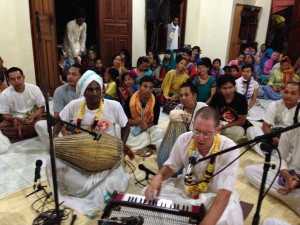
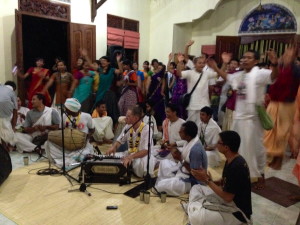
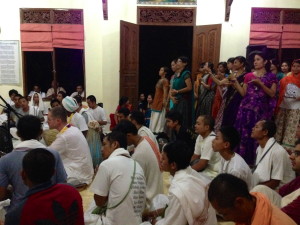
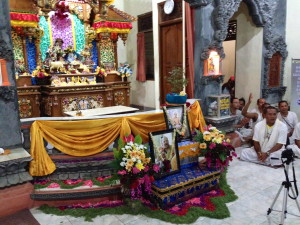
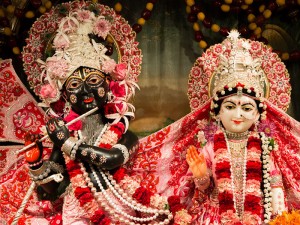 Giriraj Swami read and spoke from Srimad-Bhagavatam 2.3.23 during the Sunday festival in Houston.
Giriraj Swami read and spoke from Srimad-Bhagavatam 2.3.23 during the Sunday festival in Houston.

 It has often been said that it is easier to count the number of dust particles on the surface of the earth than to count the number of holy places in Mathura. Each of the ghats, for instance, has its own Krishna story (like Visram-ghat where He rested after killing his evil and tyrannical uncle, King Kansa)
It has often been said that it is easier to count the number of dust particles on the surface of the earth than to count the number of holy places in Mathura. Each of the ghats, for instance, has its own Krishna story (like Visram-ghat where He rested after killing his evil and tyrannical uncle, King Kansa)